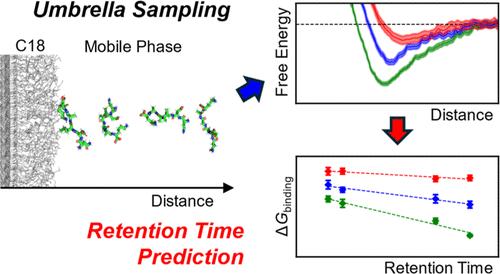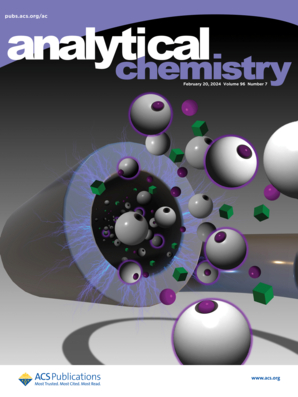Umbrella Sampling MD Simulations for Retention Prediction in Peptide Reversed-phase Liquid Chromatography
IF 6.7
1区 化学
Q1 CHEMISTRY, ANALYTICAL
引用次数: 0
Abstract
Reversed-phase liquid chromatography (RPLC) is an essential tool for separating complex mixtures such as proteolytic digests in bottom-up proteomics. There is growing interest in methods that can predict the RPLC retention behavior of peptides and other analytes. Already, existing algorithms provide excellent performance based on empirical rules or large sets of RPLC training data. Here we explored a new type of retention prediction strategy that relies on first-principles modeling of peptide interactions with a C18 stationary phase. We recently demonstrated that molecular dynamics (MD) simulations can provide atomistic insights into the behavior of peptides under RPLC conditions (Anal. Chem. 2023, 95, 3892). However, the current work found that it is problematic to use conventional MD data for retention prediction, evident from a poor correlation between experimental retention times and MD-generated “fraction bound” values. We thus turned to umbrella sampling MD, a complementary technique that has previously been applied to probe noncovalent contacts in other types of systems. By restraining the peptide dynamic motions at various positions inside a C18-lined pore, we determined the free energy of the system as a function of peptide-stationary phase distance. ΔGbinding values determined in this way under various mobile phase conditions were linearly correlated with experimental retention times of tryptic test peptides. This work opens retention prediction avenues for novel types of stationary and mobile phases, and for peptides (or other analytes) having arbitrary chemical properties, without the need for RPLC reference data. Umbrella sampling can be used as a stand-alone tool, or it may serve to enhance existing retention prediction algorithms.

多肽反相液相色谱中保护伞取样MD模拟的保留预测
在自下而上的蛋白质组学中,反相液相色谱(RPLC)是分离复杂混合物(如蛋白质水解消化)的重要工具。人们对预测多肽和其他分析物的RPLC保留行为的方法越来越感兴趣。现有的算法已经基于经验规则或大量的RPLC训练数据集提供了出色的性能。在这里,我们探索了一种新型的保留预测策略,该策略依赖于肽与C18固定相相互作用的第一性原理建模。我们最近证明了分子动力学(MD)模拟可以为RPLC条件下肽的行为提供原子性的见解。化学,2023,95,3892)。然而,目前的工作发现,使用传统的MD数据进行保留预测是有问题的,从实验保留时间与MD生成的“分数界”值之间的差相关性可以看出。因此,我们转向伞采样MD,这是一种补充技术,以前已应用于探测其他类型系统中的非共价接触。通过抑制肽在c18内衬孔内不同位置的动态运动,我们确定了体系的自由能作为肽-固定相距离的函数。ΔGbinding在不同流动相条件下测定的值与色氨酸测试肽的实验保留时间呈线性相关。这项工作为新型固定相和流动相以及具有任意化学性质的肽(或其他分析物)开辟了保留预测途径,而无需RPLC参考数据。伞式采样可以作为一个独立的工具,或者它可以用来增强现有的保留预测算法。
本文章由计算机程序翻译,如有差异,请以英文原文为准。
求助全文
约1分钟内获得全文
求助全文
来源期刊

Analytical Chemistry
化学-分析化学
CiteScore
12.10
自引率
12.20%
发文量
1949
审稿时长
1.4 months
期刊介绍:
Analytical Chemistry, a peer-reviewed research journal, focuses on disseminating new and original knowledge across all branches of analytical chemistry. Fundamental articles may explore general principles of chemical measurement science and need not directly address existing or potential analytical methodology. They can be entirely theoretical or report experimental results. Contributions may cover various phases of analytical operations, including sampling, bioanalysis, electrochemistry, mass spectrometry, microscale and nanoscale systems, environmental analysis, separations, spectroscopy, chemical reactions and selectivity, instrumentation, imaging, surface analysis, and data processing. Papers discussing known analytical methods should present a significant, original application of the method, a notable improvement, or results on an important analyte.
 求助内容:
求助内容: 应助结果提醒方式:
应助结果提醒方式:


